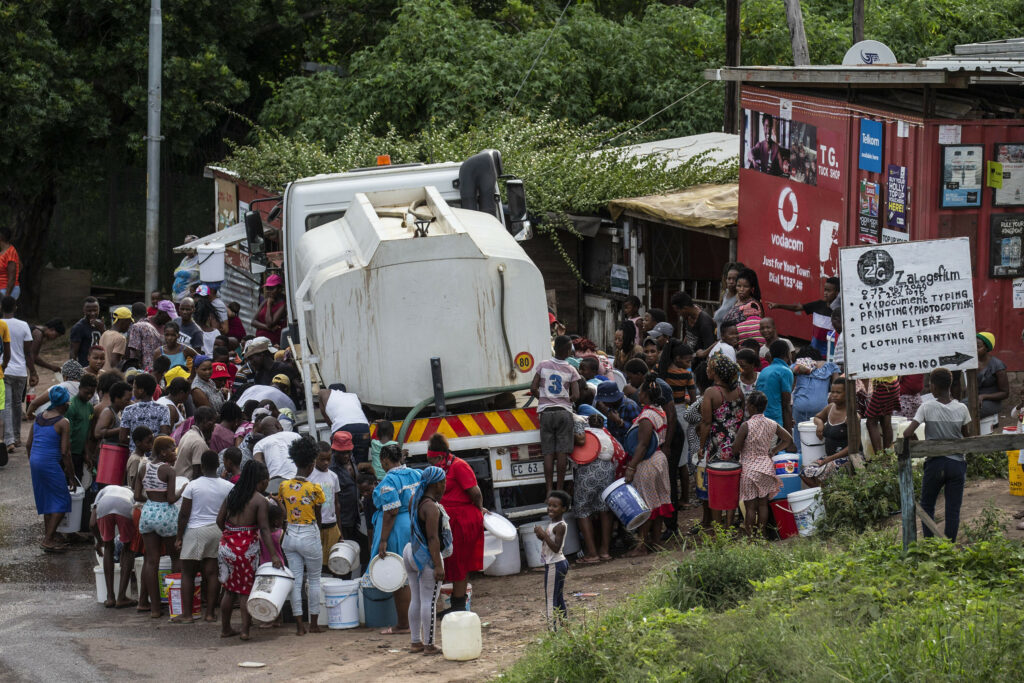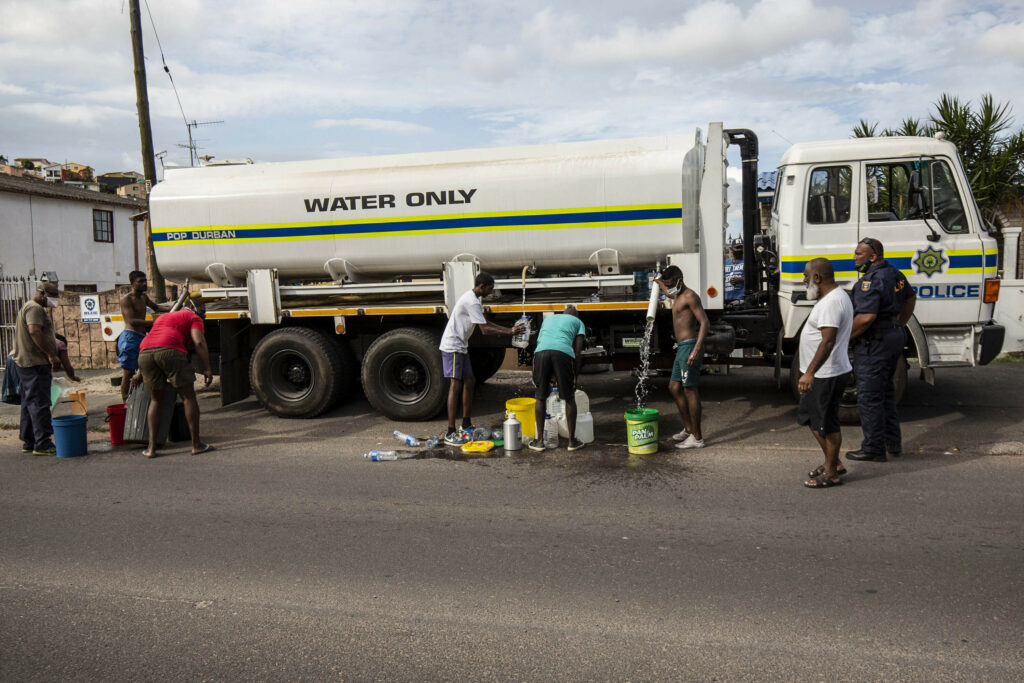Residents of Arena Park in Chatsworth get water from a municipal tanker as they face days without water, 13 January 2021. (Photograph: Rogan Ward)
KwaZulu-Natal will have to spend R100-billion over the next 10 years to replace ageing water infrastructure and build new dams to meet the demand by residents of its 54 municipalities.
This is according to the progress report on a provincial water master plan presented by the KwaZulu-Natal government last week to the province’s co-operative governance portfolio committee, which has identified the lack of maintenance and replacement of ageing facilities as being central to the province’s water crisis. The plan is being developed in conjunction with the national water and sanitation department in response to the province’s water crisis.
But residents of municipalities facing ongoing water outages caused by infrastructure collapse — including eThekwini and the Ugu district municipality on the KwaZulu-Natal South Coast — face more of the same: more than 40% of the province’s water infrastructure requires urgent maintenance within the next two years.
 Residents of the informal settlement at corner of Moorton Drive and Higginson Highway in Chatsworth get water from a municipal water tanker as they face days without water, 13 January 2021. Photograph: Rogan Ward
Residents of the informal settlement at corner of Moorton Drive and Higginson Highway in Chatsworth get water from a municipal water tanker as they face days without water, 13 January 2021. Photograph: Rogan Ward
Last week thousands of residents in Chatsworth, Pinetown and other parts of south and west Durban were left without water at the height of the spike in Covid-19 infections, driven by a second wave of the virus, after a pump at the Northdene reservoir packed up.
The eThekwini municipality was left scrambling to find a replacement pump and provide residents with tanked water for cooking, drinking and washing while the pump was replaced.
New infrastructure is being constructed while existing infrastructure is being neglected and becoming derelict, in essence increasing the backlog indirectly
Water cuts have plagued the Ugu district municipality for the past three years. The situation reached a head again this December, with visitors arriving in the coastal municipality, which includes Port Edward, Margate and other holiday towns, left without water.
Much of Ugu’s problem relates to the vandalism and sabotage of infrastructure, which has compounded the water shortages caused by increasing demand for water and municipalities’ inability to maintain reservoirs, pump stations and piping.
About 76% of the province’s population has access to running water, according to statistics from the department of water and sanitation, but the ability to continuously deliver water to them has been compromised by drought, poor infrastructure maintenance, and a lack of planning and budgeting by municipalities responsible for water reticulation.
Lack of maintenance
According to the progress report submitted to the committee, a “lack of maintenance is our biggest service-delivery problem”.
“New infrastructure is being constructed while existing infrastructure is being neglected and becoming derelict, in essence increasing the backlog indirectly,” the report said.
Capital grants were being used “today to refurbish what we built with capital grant money 10 years ago”, and the correct balance between eradicating backlogs by building new infrastructure and creating new backlogs by failing to maintain the infrastructure that already existed had not been achieved. The bulk of investment went on new projects, with only two municipalities in the province meeting their target of 8% of revenue on maintenance.
Water infrastructure maintenance, it said, required an investment of about R5.6-billion over the next two years, with about 40% of all existing water infrastructure requiring “intervention” in maintenance during this period.
Municipalities, the report said, urgently needed to put in place plans to limit water loss, which, in some cases, was as high as 77%. Municipalities across the board could not collect revenue and needed to improve this if they hoped to meet their maintenance bills and provide water to new consumers.
Among the significant projects identified by the province to improve water supply is constructing four new dams, including the R4.7-billion Mkomazi water project, work on which is already underway.
The report also identified poor governance as central to the province’s water woes.
“In general, municipalities are currently not exhibiting the traits of financially sustainable entities. Revenues are highly dependent on external transfers from government and donations, with some entities with ratios as high as 80%,” it said.
Most, it said, not only faced backlogs in providing water, but in ensuring that their existing supply was maintained to consumers.
Democratic Alliance MPL Chris Pappas, the party’s provincial spokesperson on co-operative governance, said the party welcomed the water master plan, but warned the government against “complacency” when it came to dealing with the challenges it had identified.
 Residents of Montford in Chatsworth get water from a SAPS water tanker as they face days without water, 13 January 2021. Photograph: Rogan Ward
Residents of Montford in Chatsworth get water from a SAPS water tanker as they face days without water, 13 January 2021. Photograph: Rogan Ward
The province would have to closely monitor the local and district municipalities to ensure critical infrastructure maintenance, planning and budgeting.
“We have already seen the devastating effects that poor water management can have through the ongoing Ugu water crises. This situation must be stopped from repeating itself across our province,” Pappas said.